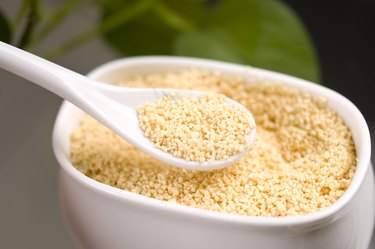
Lecithin is a product used in commercial cooking and sold as a nutritional supplement. Most lecithin products are derived from soy, and you can buy them in powder form or as granules. If you're considering taking lecithin powder or lecithin granules, talk to your doctor before adding this supplement to your routine.
What Is Lecithin?
Video of the Day
Lecithin, a substance that resembles fat, is naturally found in the cells of every living thing. There are many food sources of lecithin, including soybeans, eggs, whole grains, peanuts and wheat germ. Commercial food producers isolate lecithin from egg yolks and soybeans to use as an emulsifying agent, or a compound that helps mix two substances together that don't combine easily, such as oil and vinegar.
Video of the Day
In the body, lecithin is a precursor to choline, a nutrient that plays a role in the functioning of your brain, nerves, liver and other organs, per the Cleveland Clinic. Some people take lecithin as a supplement to help lower cholesterol, relieve mastitis and ward off Alzheimer's disease, but more research is needed to determine the true benefits of lecithin.
Lecithin Powder Versus Granules
You can purchase lecithin to take as a health supplement in pill form, or you can take it as powder or granules. Many people use lecithin powder or granules and mix it into smoothies.
As opposed to soy lecithin granules, soy lecithin powder is processed in such a way that more of the soybean oil is removed, making it less course. Nutritionally, there are some differences. For example, in Now Foods Soy Lecithin Granules ($22.97, Amazon), a 1 1/2-tablespoon serving has 70 calories and 5 grams of fat. In Soy Lecithin Powder from Bulk Supplements ($21.96, Amazon), a serving size is 1/2 teaspoon, and you'll only get 6 calories and 1 gram of fat.
There are also lecithin powders available on the market that are derived from sunflower oil. Some people prefer sunflower lecithin powders because they are trying to avoid soy, as it is a genetically modified organism (GMO), per the FDA. In a 1 1/3-tablespoon serving of Now Foods Sunflower Lecithin Powder ($15.99, Amazon), you'll get 80 calories and 5 grams of fat.
Lecithin Dosage
If you're wondering how much lecithin to take per day, there aren't any hard rules. The U.S. Food and Drug Administration (FDA) doesn't regulate supplements like lecithin, so there are no real guidelines as to how much lecithin per day you should take.
A dose of 500 milligrams of lecithin per day was linked to reduced cholesterol levels during a December 2009 study in Cholesterol.
In normal doses, or doses recommended on product labels, lecithin may cause side effects, according to the University of Rochester Medical Center. These can include:
- stomach aches
- diarrhea
- loose stools
Studies haven't been done to find out what would happen if you take too much lecithin. For more guidance on the appropriate lecithin dosage for you, check the labels on your products and as always, talk to your doctor before starting any new supplement.